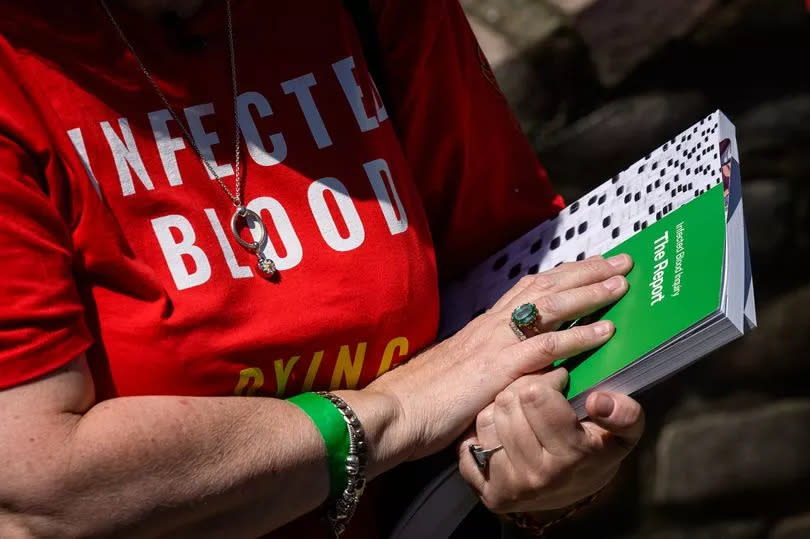Liverpool doctor coldly said 'yes you have this' to patient infected with HIV

People in Liverpool were given infected blood treatment products and treated "horrendously" after testing positive for HIV, an inquiry has found.
The official report into the infected blood scandal has found that the biggest health disaster in the history of the NHS "could largely have been avoided" and that deliberate attempts were made to cover it up.
More than 30,000 people were infected with deadly viruses while they were receiving NHS care between the 1970s and 1990s, in a disaster described by inquiry chairman Sir Brian Langstaff as a “calamity”. Some 3,000 people have died and others have been left with lifelong health complications after being infected with viruses including hepatitis C and HIV.
MORE: My funny and caring brother was victim of scandal not enough people know about
The ECHO has previously spoken to a number of family members in Merseyside who lost loved ones after they had been infected. The report makes clear that many in this city and region were affected by the scandal and were treated terribly by health professionals.
As we have previously reported, many found out they had been infected with HIV by letter. The report states: "Quite apart from the lack of humanity involved in informing a person by letter that they had been infected with HIV, it was utterly thoughtless and inappropriate to do so, not least because letters can go missing or be misdelivered."
Records of communications in Liverpool were found to be "poor and uninformative", with the records of tests carried out unable to be obtained. Patients in Liverpool said they had been informed of their positive HIV results by letter.
Where patients in Liverpool were told of their diagnosis in person, this was not done as it should have been, the report states.
Outlining one example, it adds: "The widow of a Haemophilia A patient described her husband being told during a routine appointment that a stored sample had tested positive, but the patient had not known his blood was being stored or tested.
“This consultant was flicking through my husband’s medical records and came to a page which was marked with the words “HIV”. The consultant just said the words “HIV” in a very matter of fact way and then continued to flick through the notes.
"My husband stopped him and said ‘HIV, what is that? I did not know anything about that.’ The consultant basically said words to the effect “yes you have this.”
Another woman, concerned about her husband’s health, raised concerns with senior doctor Bernard McVerry that he was suffering from the symptoms of AIDS. The report explains that Dr McVerry denied this and "told her not to be neurotic."
Having gone elsewhere for another opinion, the report says Dr McVerry told the woman “not to question his standing or undermine his opinion.” Her husband died not long after that.
The report also details how those who had been unwittingly infected with HIV were subsequently treated by health professionals.

A father, describing the treatment of his son in Liverpool, told the inquiry. “[He] had numerous hospital admissions in The Royal Liverpool Hospital where he was treated very badly and received extremely poor standards of care. It was horrendous. It was as if the nurses had nothing but contempt for the patients.
"It was necessary for me to visit him every day to ensure he was eating properly, he was washed properly and that he was receiving and taking his medication."
He added: "There were many times his medication was strewn all over the floor and I would have to make arrangements to get it replaced. I would shower him when he was too weak to do it for himself and change his bed sheets after he had soiled himself and was lying in the dirt for hours at a time.”
Amongst a harrowing list of failures highlighted by the inquiry, was the fact that instead of ensuring a sufficient supply of UK-made treatments for haemophilia, the NHS continued to import the blood clotting blood plasma treatment Factor VIII from the US – where manufacturers paid high-risk donors, including prison inmates and drug users. The UK blood services continued to collect blood donations from prisons until 1984.
Prisons were regarded as a valuable source of blood donations from the 1950s until the 1970s. But following the introduction of the screening of donors for Hepatitis B in the UK from late 1970, it "became clear that there was a markedly higher incidence of Hepatitis B amongst prisoners than there was in the general population."
The American Red Cross stopped collecting blood from prisons on 1 July 1971 because the incidence of hepatitis was ten times greater among prisoners than among voluntary unpaid donors.
In September 1973, National Blood Transfusion directors discussed discussed whether they should stop collecting blood from prisons in England and Wales.
Seven regional directors voted to stop prison sessions, while seven others - including Liverpool - voted to continue on the grounds that Hepatitis B screening gave “adequate protection."
Speaking about the findings of the inquiry that he chaired, Sir Brian Langstaff said: "The scale of what happened is horrifying."
“Lord Winston famously called these events ‘the worst treatment disaster in the history of the NHS’. I have to report that it could largely, though not entirely, have been avoided."
He added: "Viewing the response of the NHS and of government overall, the answer to the question ‘Was there a cover-up?’ is that there has been.
“Not in the sense of a handful of people plotting in an orchestrated conspiracy to mislead, but in a way that was more subtle, more pervasive and more chilling in its implications. In this way there has been a hiding of much of the truth.”
Don't miss the biggest and breaking stories by signing up to the Echo Daily newsletter here

 Yahoo News
Yahoo News 
